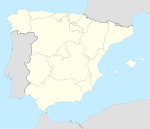Purujosa
| Purujosa municipality | ||
|---|---|---|
 Purujosa - town view
|
||
| coat of arms | Map of Spain | |

|
|
|
| Basic data | ||
| Autonomous Community : | Aragon | |
| Province : | Zaragoza | |
| Comarca : | Aranda (Spain) | |
| Coordinates | 41 ° 41 ′ N , 1 ° 46 ′ W | |
| Height : | 978 msnm | |
| Area : | 35.43 km² | |
| Residents : | 35 (Jan. 1, 2019) | |
| Population density : | 0.99 inhabitants / km² | |
| Postal code : | 50268 | |
| Municipality number ( INE ): | 50221 | |
| administration | ||
| Website : | Purujosa | |
Purujosa is a northern Spanish city and a municipality ( municipio ) with only 35 inhabitants (at January 1, 2019) in the western province of Zaragoza in the western autonomous region of Aragon . The place belongs to the poorly populated Serranía Celtibérica .
Location and climate
The place Purujosa is on the Río Isuela about 15 km (as the crow flies) southeast of the Sierra de Moncayo, which is a maximum of 2315 m high, and about 125 km (driving distance) southwest of the provincial capital Saragossa near the border with the old Castilian province of Soria at an altitude of about 900 to 980 m . The climate is temperate to warm; the rather sparse rain (approx. 530 mm / year) falls spread over the year with the exception of the rather dry summer months.
Population development
| year | 1857 | 1900 | 1950 | 2000 | 2017 |
| Residents | 426 | 425 | 396 | 40 | 37 |
The mechanization of agriculture , the abandonment of small farms and the associated loss of jobs led to a significant decline in population ( rural exodus ) since the middle of the 20th century .
economy
For centuries, the residents of the village lived directly or indirectly as self-sufficiency from agriculture, which mainly included livestock farming. The processing of sheep's wool was an important economic factor in the 16th and 17th centuries. Today the fruit growing plays an essential role in the economic life of the place; In addition, holiday apartments (casas rurales) are rented out.
history
Although the place belonged to the settlement area of the Celtiberian Lusonen , Celtiberian , Roman , Visigoth and even Arab-Moorish traces have not yet been discovered - even if a local legend tells of a visit by Emperor Constantine (r. 306–337). Around 1120 the area was recaptured by Alfonso I of Aragon ( reconquista ) ; he handed them over to the Knights Templar . In the 12th and 13th centuries, the remote little mountain village changed landlords several times - the Cistercian monastery Veruela was one of them. The area was long disputed between the kingdoms of Aragón and Castile ( Guerra de los Dos Pedros ) ; this dispute only ended with the marriage of the Catholic Kings Isabella I of Castile and Ferdinand II of Aragón in 1469.
Attractions
- The place mainly consists of empty and partly ruinous houses.
- The single-nave church of San Salvador has a Romanesque origin; however, it was modernized in the 16th century. The fact that the two church bells are integrated into the facade is interesting. Inside there are numerous abstract decorative motifs made of stucco.
- Surroundings
- There are numerous hiking trails in the vicinity of the village.
- In the Ermita de la Virgen de Constantín , about two kilometers from the village and carved into a rock face, a late Romanesque, polychrome painted figure of Our Lady is venerated.
Web links
Individual evidence
- ↑ Cifras oficiales de población resultantes de la revisión del Padrón municipal a 1 de enero . Population statistics from the Instituto Nacional de Estadística (population update).
- ↑ Purujosa - climate tables
- ↑ Purujosa - population development
- ↑ Purujosa - Church
- ↑ Purujosa - Church
- ↑ Purujosa - Ermita


